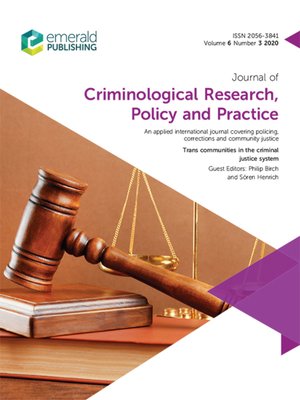Journal of Criminological Research, Policy and Practice, Volume 6, Number 3
ebook ∣ Trans Communities in the Criminal Justice System · Journal of Criminological Research, Policy and Practice
By Sören Henrich

Sign up to save your library
With an OverDrive account, you can save your favorite libraries for at-a-glance information about availability. Find out more about OverDrive accounts.
Find this title in Libby, the library reading app by OverDrive.



Search for a digital library with this title
Title found at these libraries:
| Library Name | Distance |
|---|---|
| Loading... |
The first paper in this ebook focusses on the police. In this paper Toby Miles-Johnson considers the experience of Trans communities in the CJS system as employees. Focusing on one State police force in Australia, Miles-Johnson explores the perceptions of an all Cisgender identifying workforce with regards to working alongside Transgender colleagues. . In this second paper, Sören Henrich provides an examination of assessment tools for gender identity in a forensic secure setting. Henrich presents findings from a systematic review in which he explores the assessment tools that yield the most promising outcome for those who are in secure settings seeking to transition. Staying within secure settings, Gerald Mallon and Jazmine Perez provide the third paper in this ebook, which focuses on Transgender young people involved in the Juvenile Justice/Criminal Justice System. Experiences of Transgender prisoners in Mexico is the focus of the next paper by Chloé Constant. This fourth paper is a timely reminder of the importance of tackling structural inequalities in our plight for a more just society.
Extending this line of examination is the work of Ana Selene Pineda Neisa and Douglas Durán Chavarría in the penultimate paper of the issue. Reflecting on and exploring the human rights of Transgender prisoners, as well as other members of the LGBTI community, in the Costa Rican prison system, Pineda Neisa and Durán Chavarría provide a deep consideration of the treatment of this cohort during the deprivation of liberty. In our final paper, Kirpal Sahota presents findings from clinical practice concerning Transgender sex offenders, by doing so implications for the management of this offending cohort is offered.







